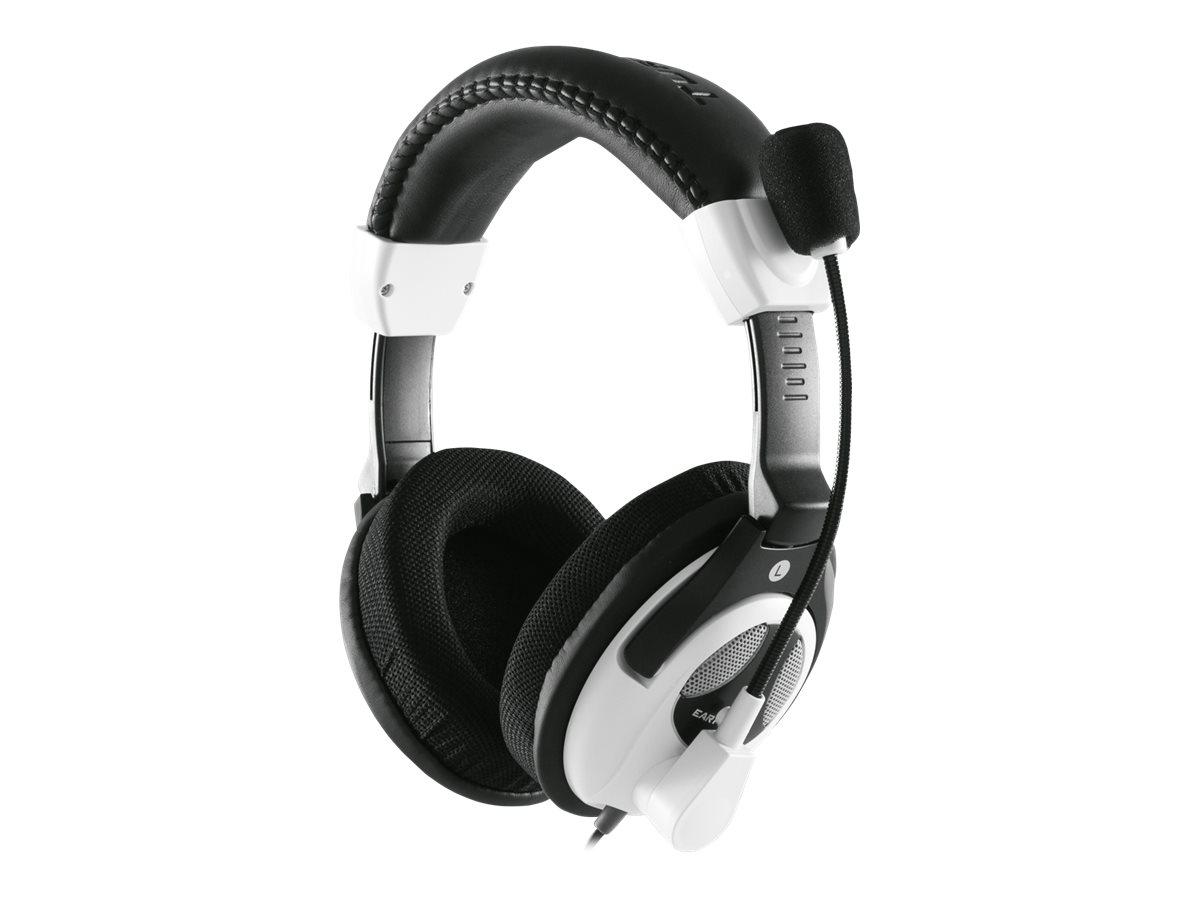
A detailed list of technical data, specifications, ratings and expert review of Turtle Beach Ear Force X11. Get a comprehensive look at your chosen headphones and see if these are the ones that will best suit your needs. You can also use the comparison feature to compare with other competing headphones.
design and dimensions sound quality microphone remote control cable features connections others
| DESIGN AND DIMENSIONS Turtle Beach Ear Force X11 |
|---|
| Product Type | Headset - wired | |
|---|---|---|
| Weight | 233 g | Worse than 69 % of headphones rated. |
| Recommended Use | Game console, computer |
The Turtle Beach Ear Force X11 are wired headphones. In the case of studio and professional DJ headphones, a wired connection is a standard and a necessity. In this case, connecting via cable reduces audio transmission delays and prevents unwanted battery drain as it would be in case of wireless headphones. The same is de facto true for gaming headsets. In case of headphones for normal music listening, the cable is rather a relic, although it still has its fans. However, the wireless option is much more popular for everyday use in today’s world.
These headphones are designed to fit around the ears. Thanks to the design, they can isolate better from external noise than, for example, over-ear headphones. This allows for better listening quality without interference. However, this design tends to make headphones heavier and less practical for frequent carrying The weight of the headphones is 233 g.
| SOUND QUALITY Turtle Beach Ear Force X11 |
|---|
| Headphones Form Factor | Full size | |
|---|---|---|
| Connectivity Technology | Wired | |
| Sound Output Mode | Stereo | |
| Sound Effects | Bass Boost | |
| Frequency Response | 30 - 20000 Hz | Worse than 82 % of headphones rated. |
| Sensitivity | 120 dB | Better than 99 % of headphones rated. |
| Diaphragm | 40 mm | Better than 75 % of headphones rated. |
| Magnet Material | Neodymium | |
| In-Cord Volume Control | Yes |
The sound quality can be affected by many factors. For many users the frequency range is a key feature of headphones. The wider the range, the more detail and nuance you will hear while listening. However, every individual perceives frequencies differently, so the frequency range of headphones varies according to individual needs. The average person perceives frequencies in the range of 16 to 20,000 Hz, so headphones with a frequency range of 20 to 20,000 Hz are most commonly available. If you are looking for headphones with a good bass performance, you should aim for lower range values (bass represents frequencies up to about 256 Hz), while high range values (frequencies roughly above 2,048 Hz) will be better for reproducing high tones. The frequency range of headphones Turtle Beach Ear Force X11 is 30 - 20000 Hz. The headphone's sensitivity determines how effectively they can receive a signal from a source. The higher the sensitivity of the headphones, the louder they can play at lower power consumption. However, at high volumes, power consumption increases, which can be a problem when listening to music from a cell phone. A sensitivity value of around 85 dB is suitable for quiet environments, while a value of around 90 dB allows for quality listening even in noisy environments. Headphones with a sensitivity value of 100 dB and above are suitable for extremely noisy environments such as concerts. Headphones Turtle Beach Ear Force X11 are designed with sensitivity about 120 dB. To control the optimum playback volume you can use the manual control directly on the cable.
Headphones consist of many important parts, including the diaphragm, which is responsible for converting electrical signals into sound. The diaphragm, with a thickness of around 6 mm, is very sensitive to changes in high frequencies but less sensitive to bass. For a relatively balanced sound profile, a medium-thick diaphragm of around 10 mm is used, which can reproduce both bass and treble. A diaphragm with a thickness of around 20 mm is not as quick to respond to changes in the audio signal, and this results in poorer bass listening. However, it is very sensitive to higher frequencies. In the case of this model, the diaphragm is the 40 mm.
| MICROPHONE Turtle Beach Ear Force X11 |
|---|
| Type | Boom | |
|---|---|---|
| Microphone Technology | Electret condenser | |
| Microphone Operation Mode | Mono | |
| Connectivity Technology | Wired | |
| Frequency Response | 50 - 15000 Hz | Better than 72 % of headphones rated. |
Turtle Beach Ear Force X11 has a boom–type microphone.
Show more| REMOTE CONTROL Turtle Beach Ear Force X11 |
|---|
| Controls | Microphone on/mute |
|---|
| CABLE Turtle Beach Ear Force X11 |
|---|
| Cable Type |
Headset cable - 4.87 m Audio splitter |
|---|
| FEATURES Turtle Beach Ear Force X11 |
|---|
| Additional Functions | Amplifier |
|---|
| CONNECTIONS Turtle Beach Ear Force X11 |
|---|
| Connector Type |
Headphones (mini-phone stereo 3.5 mm) Microphone (mini-phone stereo 3.5 mm) USB (4 PIN USB Type A) |
|---|
| OTHERS Turtle Beach Ear Force X11 |
|---|
| Included Accessories | Xbox 360 Talkback Cable |
|---|
Similar Headphones
Other Turtle Beach Headphones